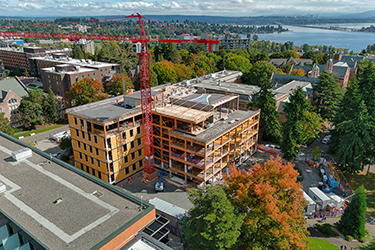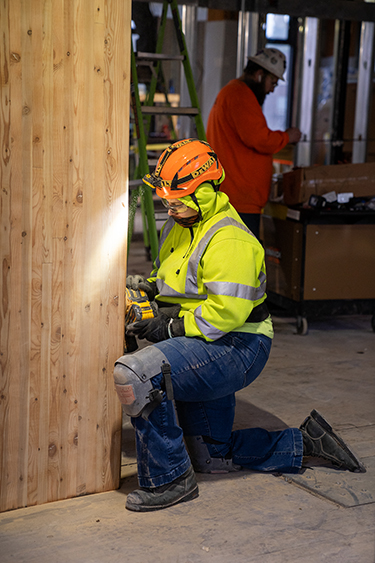|
Subscribe / Renew |
|
|
Contact Us |
|
| ► Subscribe to our Free Weekly Newsletter | |
| home | Welcome, sign in or click here to subscribe. | login |
Construction
| |
 |
October 27, 2022
UW’s first mass timber hall
Hoffman Construction

Vincent
|
Founders Hall, the first mass-timber building on the University of Washington campus, greatly enhances the capacity of the Michael G. Foster School of Business. Leveraging UW’s progressive design-build delivery model, Hoffman and our design-build partner LMN delivered a learning facility that cultivates diverse student-facing programs to further the school’s interactive culture of learning, strategic thinking, and entrepreneurial initiative.
The success of Founders Hall was a direct result of a collaborative design-build process, our integrated teams’ joint response to challenging circumstances affecting the project, and perseverance through the COVID-19 pandemic.
INTEGRATED DESIGN-BUILD TEAM
A successful design-build team begins with collaboration and finding partners with the right temperament, teamwork skills, and technical expertise. In collaboration with the Foster School of Business, Hoffman, LMN, and our design and trade partners took focused time during the early project definition phase to establish UW’s expectations and measures of success for design-build team dynamics, and to clearly articulate the project’s goals. These goals became touchpoints for design decisions and were revisited at the start of each design presentation and project management meeting.
Our early visioning exercises proved instrumental in achieving the project goals of significantly increasing building performance, and exceeded the client’s sustainability goal of being one of the greenest buildings on the UW campus. The design provided a 22% reduction of energy use, a 58% reduction in embodied carbon, and zero fossil fuel use.
Working toward a more inclusive culture. To further the UW’s efforts to become a more equitable organization, the design-build team continually strengthened stakeholder relationships based on shared goals and values around diversity, equity, access, and inclusion throughout the project. In consistently promoting a culture of respect, transparency, and accountability, we reached 28% Business Equity Enterprise participation and exceeded the university’s BEE goal by 8%.
Risk-reward partners. Hoffman and LMN signed the contract agreement at the outset to join as risk-reward partners, working together for mutual benefit and aligning the interests and goals of the university and all design-build partners. As the project gained momentum and team chemistry and dynamics took shape, the design-build team strategically engaged consultants and trade partners who embraced the risk-reward principle and strengthened the team by integrating their expertise in the development of Founders Hall.
The design-build team included MKA, PAE, McKinstry, VECA Electric, Herzog Glass, Hoffman Structures Inc., Pellco Construction, Performance Contracting, and Steelkorr. Each partner shared the risk for the project and shared the collective goal of successfully delivering the completed project as it was envisioned for the client.
ADAPTING TO COVID
The emergence of COVID-19 presented the team, trade partners, and the UW with new challenges as many companies were forced to work in a remote environment for the first time. Collectively, our project team understood we had a responsibility to achieve the common goal of keeping the site safe. The design-build team had to effectively move the project forward in the virtual environment while maintaining a continuity of our established culture of respect, transparency, and accountability.
By taking specific actions to support a distributed workforce, the project maintained the trust, performance output, and engagement of the whole team. After establishing the revised reality as a group, leadership personnel upgraded communication tools and techniques to better inform virtual members. Weekly team meetings encouraged shared leadership among team members. With guidance from the university, alignment audits were performed to ensure all members were committed to the project values and goals. Each of these steps started with the realization that delivering the project and working as a team would be different with members dispersed.
Construction supply chain issues. The pandemic also caused product shortages, delayed deliveries, and halted production in 2020. Early in the project, prior to COVID-19, the design-build team had emphasized to our trade partners, subcontractors, and the client that procurement issues are a reality. Managing the pandemic’s disturbances required a re-emphasized, multi-pronged strategy, including identifying new supplier networks, reassessing existing distribution channels, and leveraging technology for accurate demand forecasting. We created a rigorous forecasting plan to give the entire project team visibility into the impacts of labor constraints, demand uncertainty, and supply shortages. To get materials on time, we made the decision to procure materials early and pay for storage, rather than risk potentially delaying the schedule. The project was delivered for start of fall quarter 2022 despite the challenges.
MASS TIMBER TRADE PARTNER BANKRUPTCY
Hoffman’s self-perform capabilities allowed us to shield the university from significant loss and keep the project on track when our mass timber trade partner declared bankruptcy in the middle of the project. As the project was midway through mass timber installation, this was potentially a catastrophic hit to the project. Hoffman took immediate action, securing the already-fabricated columns and mass timber panels from the supplier’s factory in eastern Washington in less than three weeks and beginning to source an alternate supplier for the remaining panels.
Leveraging relationships with every mass timber supplier in North America, Hoffman identified two suppliers that could produce the exact profile of the previously installed mass timber. Having installed wood up through the third floor of the building and setting the concrete elevation on the classroom side, the design and depth were solidified with no room for change or error.
While the new supplier fast-tracked production of the mass timber panels, collaboration with subcontractors redirected efforts to other vital areas of the project schedule to keep project momentum.
Hoffman’s structural self-perform company, Hoffman Structures Inc. (HSI), was able to leverage its pool of 100-plus carpenters to take over the installation and keep the project moving forward. Hoffman also hired former employees of the supplier to ensure a smooth hand-off for installation. HSI was able to begin installing mass timber panels from the new supplier within just 11 weeks of learning of the supplier’s bankruptcy.
By implementing UW’s progressive design-build delivery model and working through the challenging circumstances of a trade partner bankruptcy, and navigating an unprecedented pandemic, the University of Washington, Hoffman, and LMN successfully envisioned and delivered an interactive learning environment focused on cultivating diverse student-facing programs specifically designed to support the school’s entrepreneurial culture, strategic thinking, and active learning culture. Founders Hall will undoubtedly inspire future generations of business leaders for years to come.
In his 27 years at Hoffman, Bob Vincent has provided leadership on many of the firm’s most challenging and groundbreaking projects, including multiple projects at the University of Washington, the iconic Seattle Central Library, and the recent Century Project Space Needle renovation.
Other Stories:
- Founders Hall — A model for the next century of campus building
- Delivering campus energy and carbon savings 14 years ahead of schedule at UW Seattle




